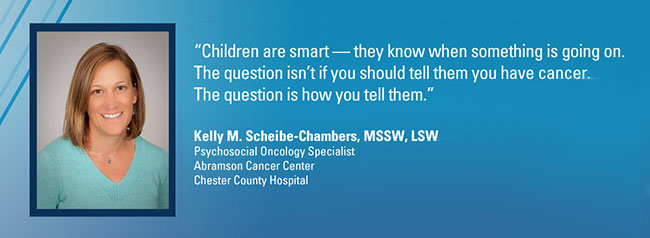
The moment you learn you have cancer might be one of the most difficult and emotional moments in your life — and telling your loved ones can be like getting the news all over again. And when those loved ones are your children — whether they’re 4, 14, or 40 — the conversation can be even more gut-wrenching.
You always want your children to be happy, so it's hard when you can't shelter them from news like cancer. Fortunately, there are ways to make the conversation easier.
Kelly M. Scheibe-Chambers, MSSW, LSW, is a social worker at Chester County Hospital who specializes in psychosocial oncology — the psychological and social aspects of having cancer. She explains how to tell your child that you have cancer and what to expect.
Question: When is the best time to tell my child that I have cancer?
Kelly M. Scheibe-Chambers: It’s a good idea to tell your child early on, but you don’t need to tell them the day you’re diagnosed. They will probably have questions, so it might be best to wait until you have learned more about your diagnosis and treatment plan. That way, you’ll have a better idea of how to answer.
Be sensitive to the time you’re speaking with them. Are they going to be running out the door for karate in half an hour? Is their first school dance the next night? Make sure there will be enough time for questions and for them to digest the information.
Q: Is it okay to show emotion?
A: It’s perfectly natural to be emotional and it’s okay to cry in front of your child. Being honest about your emotions can help them be honest, too.
A good rule of thumb is to hold off if you’re so emotional that you can’t speak or stop crying. Be in as positive a place as you can. But, there isn’t a set bar of what’s considered too emotional or not emotional enough. That can be different for every family.
Q: How much do I need to tell them?
A: This depends a lot on your child’s age. But no matter what, be open with all of your children, regardless of age.
If your child is under age 10, explaining the basics of cancer — a brief definition, where in your body the cancer is —is probably enough. Your very little one might not even be able to understand the word cancer. But that doesn’t mean you shouldn’t tell them at all. You can say something like, “I am sick on the inside,” or, “I have a boo-boo that you can’t see.”
For older children, you can give a little more information, like if you will need chemotherapy. Older children and teenagers will probably turn to their favorite source — the internet. This can be a great resource, but it’s also full of misinformation that could be misleading or scary. Give them some guidance on which sites to use, such as the American Cancer Society or the Centers for Disease Control and Prevention (CDC) pages.
At Chester County Hospital, we recommend the I Can Cope free online educational program from the American Cancer Society. This program is for both cancer patients and their loved ones. It has self-paced classes that can be taken 24/7, with topics such as general cancer information, communication with the family, managing side effects, and more. Learn More! >>

Q: I have a child who is away at college. How do I tell them?
A: Cancer is the kind of news that’s best received in person. If your child is coming home soon, wait until you can talk face-to-face. Or, if possible, consider visiting them at school before you start treatment.
However, that’s not always possible, which is where things get a little tricky.
Try to get as close to face-to-face as you can, like with a video chat. And it’s probably a good idea to avoid putting it in a text message or email.
Q: What reactions should I expect?
A: It’s hard to say, since every child reacts differently and their reactions can surprise you. If they don’t ask questions or say much, still keep the conversation going. Instead of asking, “How do you feel about this?”, tell them that they can talk to you whenever they’re ready.
Q: How do I respond if my child asks if I’m going to live?
A: If your cancer isn’t terminal, reassure them that some cancers can be cured. It’s just going to be a very big, challenging bump in the road.
If it is terminal, it may be tempting to shield your child from that news. But as difficult as it may be, honesty is still the best policy. There are ways to frame it so that it’s easier to tell them. You can say, “I’m not going to die today or tomorrow. I’m going to fight this cancer as long as I possibly can. None of us knows when we will die, and until that day comes for me, I’m going to live.”
Q: What support is available for my child?
A: There’s nothing like the support of the family, but your child may need outside care, too. An experienced professional, such as a psychologist or social worker, can guide them through emotions and help them cope. Or, your child may benefit from a support group. Hearing from others who are going through similar experiences can help them feel less alone. If there isn’t a support group near you, check for online groups.
Additional Information and Resources
Support isn’t just for your children. You can also benefit from talking to others or a professional about issues like telling your children about cancer or balancing cancer treatment with raising a family.
Also Read:
If you have more questions about telling your children about cancer, your oncologist can help. Ask your care team what support services are available to you, such as social work services or support groups.